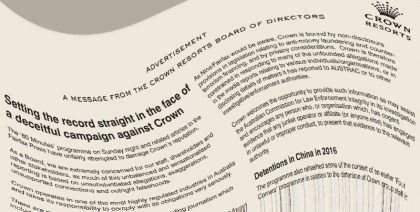Crown Resorts Fires Back at Junket Exposés in Corporate Advertisement
Australia’s Crown Resorts has taken a major first step at image rehabilitation in the wake of a damning video exposé, recently broadcast by “60 Minutes Australia”, with the creation and publication of a full-page advertisement in which the Aussie casino giant largely disputes the many allegations regarding its junket-related efforts to attract rich Chinese gamblers to its casinos over the past several years. That marketing effort eventually led to the arrest in China of 19 Crown employees and executives in October 2016, 16 of whom were eventually sentenced to jail for their activities on Crown’s behalf.
The advertisement, titled “Setting the record straight in the face of a deceitful campaign against Crown,” was published on Crown Resorts’ corporate website today and appears designed for insertion into prominent Australian print publications. The full-on response to the exposé attempts to shoot holes through its many allegations of corporate wrongdoing. The 60 Minutes Australia video was accompanied by prominent print features in The Age and the Sydney Morning Herald. The advertisement was signed by the 11 members of Crown Resorts’ board of directors.
 Though full of corporate heat, there’s a chance that Crown Resorts’ pushback might end up as a glorious misfire as the company faces a likely investigation headed by Australia’s Parliament. The ad parses its phrasings carefully as it touches on allegations of money laundering and the use of its political pull to hasten visa approvals for Chinese gambling whales, while also denying many of the allegations regarding years of dealings with Asian junketeers having organized-crime ties.
Though full of corporate heat, there’s a chance that Crown Resorts’ pushback might end up as a glorious misfire as the company faces a likely investigation headed by Australia’s Parliament. The ad parses its phrasings carefully as it touches on allegations of money laundering and the use of its political pull to hasten visa approvals for Chinese gambling whales, while also denying many of the allegations regarding years of dealings with Asian junketeers having organized-crime ties.
Still, perhaps the most dangerous ground tread upon in the advertising statement is Crown Resorts’ responses to the Chinese arrests. That section reads as follows:
Detentions in China in 2016
The programme also rehashed some of the content of an earlier ‘Four Corners’ programme in relation to the detention of Crown group staff in China in 2016.
The foundation of the criticism of Crown in the programme is that Crown knew that the conduct of its staff constituted an offence in China and that it deliberately flouted the law.
This is wrong. Crown was not charged with or convicted of any offence in China.
The relevant prohibition under Chinese law is contained in Article 303 which concerns arranging ‘gambling parties’. At all times Crown understood that its staff were operating in a manner which did not breach that provision.
Also, at all relevant times, Crown obtained legal and government relations advice from reputable, independent specialists. The fact that staff were nevertheless detained and convicted is not an indication that the advice was wrong or disregarded, but an illustration of the challenges involved in anticipating how foreign laws can be interpreted and enforced.
The ‘60 Minutes’ programme featured a former junior employee and several purported experts. Whether they were paid for the ‘60 Minutes’ appearance was not disclosed. Also, the objectivity of the former employee is open to question on the basis that she made an unsuccessful demand for compensation from Crown of over 50 times her final annual salary.
The story of the “junior employee”, Jenny Jiang, was featured in a print interview published by The Age in addition to her presence within the “60 Minutes Australia” video. Jiang was detained for four weeks but was ultimately released without a further jail sentence, unlike 16 of her former co-workers. Jiang alleged that Crown offered her $60,000 to remain silent about the activity that led to the arrests, while taking extreme measures to keep herself into much of Crown’s other activities connected to the marketing aimed at China’s wealthiest gamblers.
Statements such as “Crown was not charged with or convicted of any offence in China” might have an element of technical correctness but largely defy all credulity. The 16 sentenced Crown employees were also assessed a collective fine of $1.35 million, which Crown paid, because the activity, in violation of China’s strict gambling laws, was done on Crown’s behalf. Not all countries deal with crimes committed by foreign corporations in the same manner, and here, China had the China-based Crown Resorts employees under arrest and charged them as individuals. Claiming that the company wasn’t charged is an extreme parsing of the reality of the situation.
There’s likely to be several more startling developments as Crown’s international marketing efforts are brought into public view. Crown’s strong political connection within Australia are also likely to be put under a harsh spotlight.




















COMMENTS